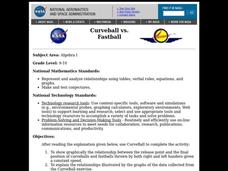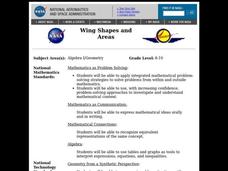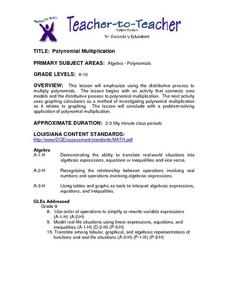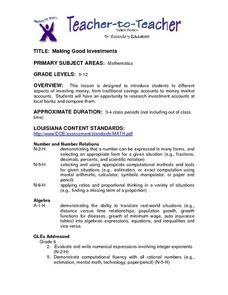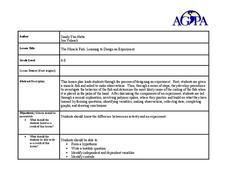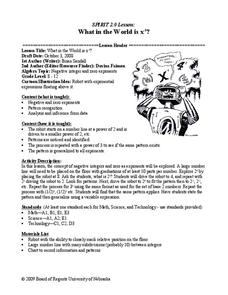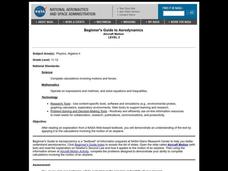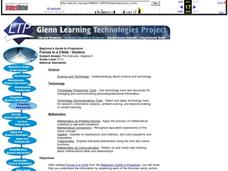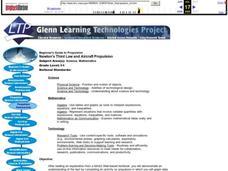Curated OER
The Baseball and Air
Students use Curveball to complete the activity to determine how the speed of airstreams changes in relation to changes in the distance of the airstream from the center of the baseball.
Curated OER
Curveball vs. Fastball
Students graph the relationship between the release point and the final position of curveballs and fastballs thrown by both right and left handers given a constant speed, and explain the relationships illustrated by the graphs of data.
Curated OER
Wing Shapes and Areas
Students, after reading the explanation given below, use FoilSim to determine the weight of the aircraft that can be lifted by a pair of wings of each type. They also design a unique platform of a wing to lift a plane weighing 11500 pounds.
Curated OER
Climate and Periodic Functions: Science & Math Integration
Students complete a lab that introduce the scientific concept of climate on Earth. Following the lab, they complete further research on climate. Using average monthly temperatures students construct a mathematical model and analyze the...
Curated OER
Area graphics for 7th graders
Students randomly select dimensions for three geometric shapes (square, right triangle and circle). From the graphs they compare and contrast the graphical results of each shape.
Curated OER
Researching a Scientist/Inventor
Young scholars research scientists and inventors. They research their figure and write notes on a Fact Card template, biographical information regarding their figure, their occupation and achievements. After citing their information and...
Curated OER
Polynomial Multiplication
Students review information about how to multiply polynomials and then work in pairs to complete a worksheet. They use graphing calculations to help them solve their math problems.
Curated OER
Making Good Investments
Students compare different aspects of investing money from traditional savings accounts to money market accounts. They research investment accounts at local banks and compare them.
Curated OER
Getting Familiar with Fractals
Young scholars use the Internet to answer lab questions about fractals, and then construct fractals using the initial stage and iteration rule. They complete tables and generate rules for the "nth" term and create their own fractals.
Curated OER
Famous African Americans ABC Book
Young scholars investigate the concept of a biography by using famous African Americans for a subject. Each student is assigned one biography and conducts research in order to complete an ABC book for the class that is used for display...
Curated OER
Linking Algebra to Temperature
Students convert between two units as they calculate the temperature. In this algebra lesson, students collect data on seasonal climate and create a graph. They make conjectures based on their data collection.
Curated OER
The Miracle Fish: Learning to Design an Experiment
Learners develop procedures to explore the behavior of fish. In this scientific experiment lesson students from a hypothesis, write a question, identify different variables and controls in their experiment.
Curated OER
Negative Exponents
Young scholars solve negative exponential functions. In this algebra lesson, students define the properties for rewriting functions with negative and zero exponents. They use a robot to create a visual of what is happening to the...
Curated OER
Trimmed Aircraft
Students, after reading an explanation from a NASA Web-based textbook, demonstrate an understanding of the text by applying it to the calculations involving the motion of an airplane.
Curated OER
Aircraft Motion
Students, after reading an explanation from a NASA Web-based textbook, demonstrate an understanding of the text by applying it to the calculations involving the motion of an airplane.
Curated OER
Aircraft Motion
Students, after reading an explanation from a NASA Web-based textbook, demonstrate an understanding of the text by applying it to the calculations involving the motion of an airplane.
Curated OER
Wing Area
Young scholars demonstrate an understanding of the text by applying it to the calculations involving the area of a wing. They use an online textbook to help them calculate the area of the surface of wing planforms.
Curated OER
Ratios (Cost of a Habit)
Students consider an individual habit and its cost. They study ratios and proportions, and use that knowledge to calculate the cost of a habit over extended periods of time. write a detailed comparison of the costs.
Curated OER
How Much Is Too Much?
Learners examine population growth and collect data. In this statistics lesson, students create a scatter plot to represent the different species found in the water and are being harvested. They graph their data and draw conclusion from it.
Curated OER
Estimation and Computation
Second graders practice their estimation skills using blocks. In this math lesson, 2nd graders explain how estimating makes addition easier. They complete a worksheet after the lesson to reinforce new learning.
Curated OER
Forces in a Climb - Vectors
Students read Forces in a Climb from the Beginner's Guide to Propulsion, and explain each of the formulas using vectors.
Curated OER
Newton's Third Law and Aircraft Propulsion
Learners research propulsion, graph data, and interpret the results.
Curated OER
Wind Tunnel Aerodynamics Problem Set
Students, after reading an explanation from a NASA Web-based textbook, demonstrate an understanding of the text by applying it to the calculation of area, velocity, and pressure in a wind tunnel.
Curated OER
Topic 6: Evaluating and Presenting Results
Learners construct spreadsheets from raw data. In this spreadsheet construction lesson, students compile data into Microsoft Excel. Learners familiarize themselves with entering and presenting data in a spreadsheet.



